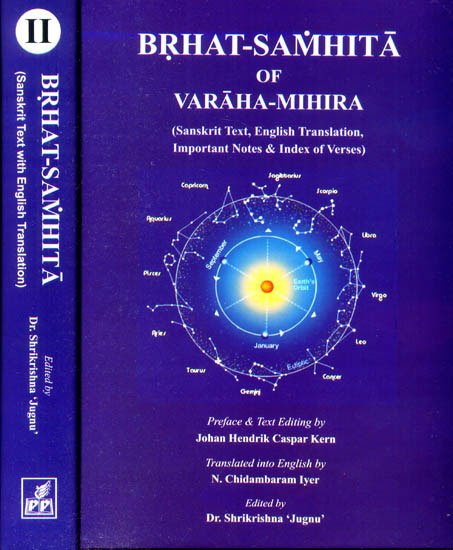Brihat Samhita
by N. Chidambaram Iyer | 1884 | 135,584 words | ISBN-13: 9788171104215
This page describes tooth-brush (dantakashtha-lakshana) which is the eighty-fifth Chapter of the English translation of the Brihat-samhita. This work, written by Varahamihira in the 6th century, is classified as jyotisha literature, also known as Indian astronomy. It contains however, also content regarding astrology, palmistry, agriculture, gardening, perfumes, medicines and various other encyclopedic topics.
Chapter 85 - On Tooth-brush (dantakāṣṭha-lakṣaṇa)
[Sanskrit text for this chapter is available]
1. Tooth-brush (dantakāṣṭha) may be made of the twigs of spreading creepers, creepers, shrubs and trees. A description of all their effects will be long and elaborate. We shall therefore confine ourself to twigs which are to be chewed to secure certain special ends.
2. Twigs of unknown trees shall be rejected, and twigs with leaves, those of an even number of joints, those which are split or dry at the ends and those with no bark ought not to be chewed.
3. The twigs of Vikaṅkata[1], Śrīphala[2] and Kāśmarī[3], if chewed, will give a person Brāhminical splendour. The twigs of Kṣema will secure to a person a good wife. The twigs of the Banyan will increase a person’s wealth and stock of grain. The Arka twig will increase the splendour of his appearance. The Madhūka twig will give him a son.
4. The twigs of Śirīṣa and Karañja if used as tooth-brush will make a person wealthy and prosperous. Those of Plakṣa will bring him money. Those of Aśvattha will make him respected by the people and renowned among his own caste-men.
5. The twig of the Badarī if chewed as a tooth-brush (dantakāṣṭha) will make a person healthy; that of the Bṛhati[4] will give him a long life; that of the Khadira and Bilva will increase his wealth; that of the Atimukta and Kadamba will bring him the object of his desire.
6. The twig of the Nīpa if chewed as a tooth-brush will bring wealth to a person; that of the Karavīra will bring him good meals; that of the Bhānḍīra[5] will bring him much food; that of the Śamī, Aṛjuna and Śyāmā will destroy his enemies.
7. The twig of Aśvakarṇa, Bhadrataru[6] and Cāṭarūṣaka if chewed as a tooth-brush will bring a man dignity; those of Priyaṅgu, Apāmārga[7], Jambū and Dāḍimā will make a person beloved of all people.
8. Facing the north or the east, a person shall chew the toothbrush and cleanse his teeth, for a year, firmly placing before his mind his object of desire. He shall, after its use, wash the toothbrush with water and throw it in a pure spot.
9. If the tooth-brush (dantakāṣṭha) when thrown away after its use be seen to stick to the ground with one end while the other end points to him and in a Śānta (benefic) quarter (vide stanza 12, next chapter) prosperity is indicated; if it should stick for a time and then fall, the person will get good meals and if it fall otherwise the person will suffer miseries.
Footnotes and references:
[1]:
Vikaṅkata: Gymnosporia spinosa.
[2]:
Śrīphala: the Bilva tree.
[3]:
Kāśmarī: the plant Gmelina arborea.
[4]:
Bṛhati: the Egg plant.
The other trees occurring in this chapter have already been explained, vide glossary of Botanical terms—Part-II.
[5]:
Bhānḍīra: Indian fig tree.
[6]:
Bhadrataru: the plant Trapa bispinosa.
[7]:
Apāmārga: the plant Achyranthes aspera.
